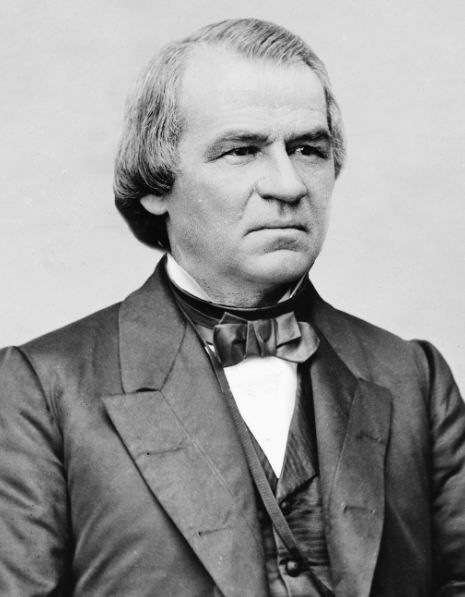Jacob Johnson and Mary McDonough Johnson had Andrew Johnson on December 29, 1808, in Raleigh, North Carolina. He was the youngest among their two children. His father worked as a porter in a local inn, Jacob even worked as sexton in a Presbyterian Church. He also served as a constable; however, he died when Andrew Johnson was only three years old and left his widow in poverty. Mary worked as a spinner and weaver to support her family. She eventually remarried.
At the age of fourteen, Andrew Johnson worked as an apprentice tailor. In 1826, his family moved to Greeneville, Tennessee, and even broke his indenture to his employer.
He opened his tailor shop with A. Johnson, Tailor sign on it. He even hired a man to read to him while he was sewing. Most of the books read to him were about some of the world’s great oration and the Constitution of the United States, which he could recite from memory.
Andrew Johnson was mostly self-taught and learned to read and spell on his own. He never attended school. In 1827 when Andrew Johnson was eighteen years old, he married Eliza McCardle, daughter of a shoemaker, who was only 16 years old. She diligently taught him to read, write fluently, and do arithmetic. She also read to him while he worked.
Eliza contracted tuberculosis when she reached middle age and rarely appeared in public during her husband’s presidency. Their eldest child, Martha, wife of David T. Patterson, filled the duty of being the White House hostess.
Andrew Johnson built a political base of poor people to serve as their voice in the government. His lack of formal education became an asset and earned the trust of his neighbors. His tailor shop turned into a center of a political discussion that honed his oration skill; he became a public speaker and a debater, which became his powerful political tool.
At the age of 21, he organized a workingman’s party, and his colleagues elected him as an alderman then he later became the mayor of Greeneville. Andrew Johnson served as a legislator for eight years under the Democratic Party. He then emerged as the representatives of mountaineers, small farmers, and laborers to help their land classes’ interests. Because of his promising political outlook, it paved his way in the United States Senate and served for a decade. He then returned to Tennessee to serve as governor.
In 1856, he returned to national politics as a senator, where he adheres to the dominant Democratic views and approved lower tariffs and oppose antislavery tension.
When Abraham Lincoln was elected in 1860, he broke with the Democratic Party and opposed southern states from seceding. Among all the southern senators, he alone remained at his post and refused the offers to join the Confederate Government. He continued to be loyal to the Union. In May 1862, Abraham Lincoln commissioned him as Military Governor of Tennessee to recognize his firm support to the Union.
As he was not part of the Democratic Party any longer, Republican Party adopted him and was selected to be Abraham Lincoln’s running mate of his re-election in 1864.
During his inauguration day, he was intoxicated and even stumbled with his words and tripped. Many of his colleagues in the administration were embarrassed and disappointed. His critics furiously accused him of habitual drunkenness, and the majority of northers newspapers were dismayed.
Because of Abraham Lincoln’s assassination, he assumed the presidency on April 14, 1865. He faced a massive vexing problem of putting the Union together by settling the future of the former Confederate States and restore it to the Union.
Andrew Johnson granted amnesty to former confederates and permitted the rebel states to elect a new government. Little did he knew that the newly formed governments were ex-confederate officials and aimed to control and inhibit free slaves through the black codes they enacted.
Many Radical Republicans considered Andrew Johnson’s reconstruction approach to be too lenient.
He vetoed Freedman’s Bureau Bill and the Civil Rights Bill in 1866. It aimed to protect blacks. In the same year, the 14th amendment was passed by Congress. It contains the granting of blacks’ citizenship even though the president urged the southern states not to ratify it; nonetheless, it was authorized in July 1868.
Andrew Johnson and the Congress’ tension intensified. In February 1868, the House of Representatives voted to impeach him. Eleven charges were pressed against him, including the Tenure of Office Act’s violation after he suspended the Secretary of War, Edwin Stanton, for opposing his reconstruction policies.
In May of the same year, the Senate acquitted Andrew Johnson of the charges by one vote.
He did not aspire to run in 1868 for re-election, although he hoped for his first political party, the Democrats, to select him as their presidential nominee. They picked Horatio Seymour instead, and the Republicans chose Ulysses Grant, a Civil War Hero, who won as the eighteenth president of the United States.
After serving as president, Andrew Johnson continued his interest in politics and public office. Andrew Johnson attempted to run for the United States Senate, but it turned out unsuccessful. His perseverance earned him a senate seat in 1875 and became the only former president to accomplish such great heights. However, he did not finish his tenure after he unexpectedly died at 66 on July 31, 1875, due to a stroke while visiting a family in Carter County, Tennessee.
US Presidents | ||
